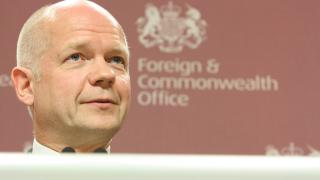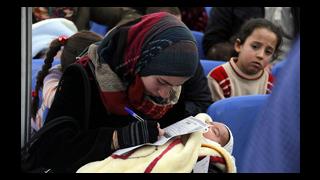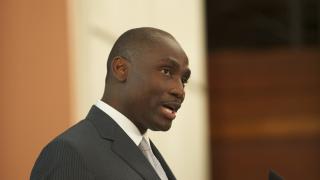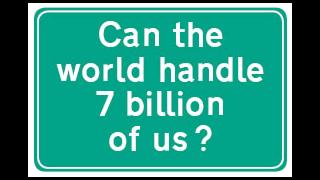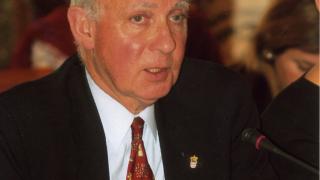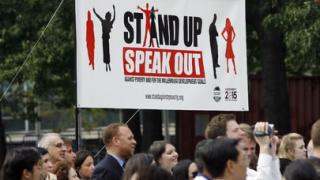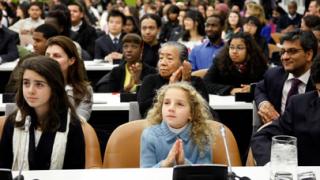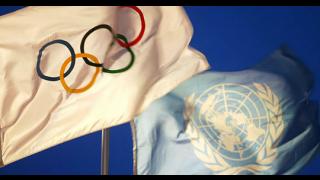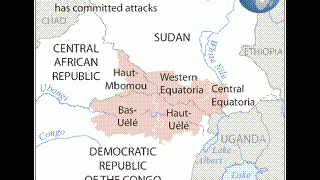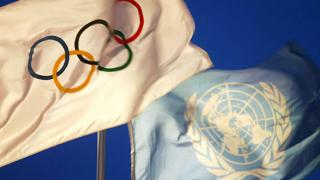
This year, Lord Coe, as Chairman of the London Organising Committee of the Olympic Games (LOCOG) and on behalf of the UK and the International Olympic Committee, will move the formal adoption of the Olympic Truce for the London 2012 Olympic and Paralympic Games before the United Nations General Assembly (UNGA).
The wording of the Truce will be based on the first UNGA Olympic Truce Resolution (A/RES/48/11), which urges;
all Member States to take the initiative to abide by the Truce, individually and collectively, and to pursue in conformity with the purposes and principles of the Charter of the United Nations the peaceful settlement of all international conflicts.
Despite being adopted by all UN member states, this resolution has hitherto been largely ignored at a government level. Today the Olympic Truce is seen as a symbolic act accompanied by a flag outside the Olympic Stadium and a peace wall inside the Olympic village. But that was not always the case. At the outset of the Ancient Olympic Games the Truce was not symbolic but sacred.
In 776 BC the Greek King Iphitos, frustrated at the perpetual state of war, consulted the Oracle at Delphi who proposed a sporting competition every four years which would have as its aim the bringing together of military and political leaders in one place where they could seek to resolve their differences peacefully.
The Sacred Truce was remarkably successful: The ancient Olympics ran for 1,168 years until they were ended by the Romans in AD394. During that time violations of the Truce were extremely rare. By contrast, in the 116 years of the Modern Olympiad, the Games have been cancelled three times due to war, have experienced major boycotts five times and been the focal point of terrorist attacks twice.
In ancient Greece they stopped fighting to take part in the Games. In the Modern era, we stop the Games in order to keep fighting. What is it that we have lost in 3,000 years of civilisation that makes even the notion that combatants may exercise restraint during a period of Truce such a distant dream?
Of course, there are major differences between the Games then and now, and these should be acknowledged:
In the ancient Games, athletes competed together as 'Olympians' rather than as representatives of any city or nation state. This ideal is reflected in the opening and closing ceremonies of the modern Games where athletes enter the stadium in their national teams at the start of the Games, but enter together as 'Olympians' for the closing ceremony. The ancient Truce was sacred because the Games were held on neutral and holy ground - the Temple of Zeus at Olympia, producing an atmosphere perhaps best imagined today as a combination of Wembley Stadium and Westminster Abbey - and athletes assumed an appropriate reverence in their conduct. Today the Games are awarded to political nation states and, far from being a unifying force, diverse religious beliefs can be a barrier. The nature of conflict too has changed. Many of the conflicts happening around the world today are civil conflicts and involve non-state actors who are not, of course, members of the UN.
Given these substantial differences, it is understandable that the Olympic Truce has been labelled as politically 'too hot to handle' and therefore been downgraded to a symbolic gesture. Could it be something more than that? Perhaps not sacred or symbolic, but serious nonetheless.
What would a serious Truce look like in the modern context? In order for a meaningful Truce to be observed, responsibility for implementing it needs to be taken by governments and the UN rather than athletes and organisers. In the past, states have willingly put their names to the UNGA Olympic Truce Resolution but have then insisted that it is the responsibility of the Organising Committee and the Olympic Committee. LOCOG is rightly focussed on delivering a world-class sporting event and athletes, of course, are concentrating on their performance. Only governments have access to the full range of political and diplomatic levers which will need to be pulled in order to move from a symbolic to a serious Truce.
Secondly, diplomatic planning for the Truce must begin a couple of years before the Games rather than a few months, which has recently been the norm. Such highly complex negotiations need to be given adequate time and resources. For this reason, I believe that the window of opportunity to convince the government of the merits of the Truce is narrow. If Lord Coe's proposition of the Truce at the UN General Assembly in 2011 is not accompanied by a public and tangible declaration of the support by the UK government, then the prospects for success will be all but eliminated.
Third, attention needs to be shifted beyond the Truce as an institution to the Truce as an instrument. When the guns fall silent the voices of reason can be heard and when the guns stop the delivery of vital humanitarian aid can start. Here we have a compelling example to draw upon:
In 1997, Jeremy Gilley, a British documentary producer, began a campaign to get the international community through the UN to observe each year 'one day of global peace' the Peace One Day campaign. Four years later, the idea was endorsed unanimously at the UNGA, having been proposed by the British Government. In 2007/2008 and 2009 Peace One Day brokered a one day truce in Afghanistan to allow health workers from UNICEF, WHO, UNAMA and other agencies to move into hitherto unreachable areas and immunize 4.5 million children against polio. This is an utterly inspiring story which shows what can be achieved during a period of truce.
Some may look upon the Olympic Truce as a dangerous and naive concept but I would counter that the opposite is actually the case. The Truce obliges the signatory only to 'pursue initiatives for peace and reconciliation'. If other parties, state or non-state, do not accept the offer then we are under no obligation to hold to it ourselves. A Truce is an agreement between two or more warring parties: no agreement, no Truce.
George Bernard Shaw observed that "peace is not only better than war, but infinitely more arduous". Advancing a meaningful Olympic Truce will be arduous in the extreme but using it as an opportunity to resolve differences between member states is the greatest prize which the founders of the Ancient Olympics have bequeathed to the modern era and it is surely worth the trying.
Michael Bates is a member of the House of Lords. From 1992 to 1997 he served as a Member of the House of Commons, during which time he held a number of ministerial posts including Government Whip and HM Paymaster General based in the Cabinet Office. Recently Lord Bates has served as Deputy Chairman of the Conservative Party and has held a number of frontbench roles including Cabinet Office and Communities & Local Government.

